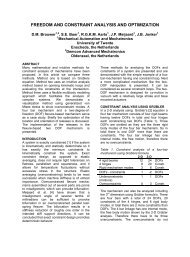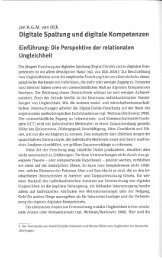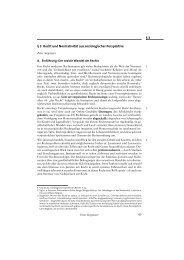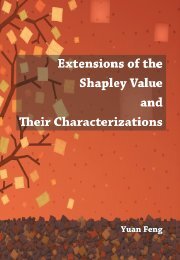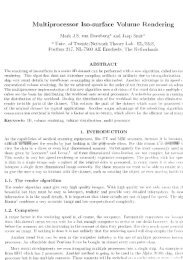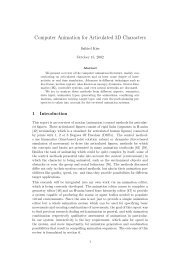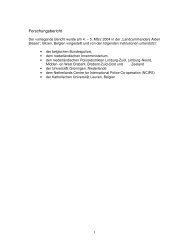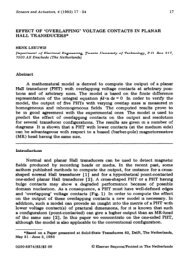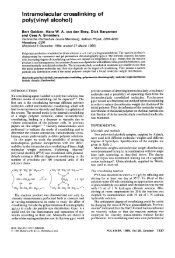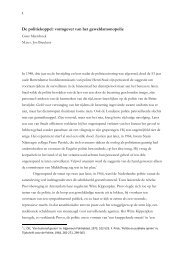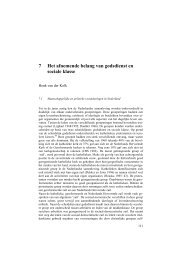Innovation and institutional change: the transition to a sustainable ...
Innovation and institutional change: the transition to a sustainable ...
Innovation and institutional change: the transition to a sustainable ...
You also want an ePaper? Increase the reach of your titles
YUMPU automatically turns print PDFs into web optimized ePapers that Google loves.
Theoretical perspectives 35<br />
organizations jeopardized <strong>the</strong> st<strong>and</strong>ing of <strong>the</strong> au<strong>to</strong>mobile, <strong>and</strong> had not<br />
au<strong>to</strong>mobile clubs played an active role in defusing opposition, <strong>the</strong> industry<br />
might have faced stringent legal constraints on <strong>the</strong> use of cars. Similarly, in<br />
<strong>the</strong> biotechnology industry, concerns about <strong>the</strong> dangers of rDNA technology<br />
<strong>and</strong> threats of reckless organisms might have led <strong>to</strong> restrictive laws had not<br />
professionals quickly devised voluntary safeguards, <strong>and</strong> forestalled<br />
governmental intervention” (Rao <strong>and</strong> Singh, 2001: 263). The importance of<br />
creating <strong>and</strong> maintaining legitimacy is also confirmed by authors such as<br />
Oliver (1992) <strong>and</strong> Suchman (1995). Oliver (1992) shows how reduction in<br />
legitimacy, such as when changing societal values become shared <strong>and</strong><br />
represented by governments, or when higher efficiency st<strong>and</strong>ards are set by<br />
government bodies, may lead <strong>to</strong> de-<strong>institutional</strong>isation.<br />
The approach utilised by Holm (1995) in underst<strong>and</strong>ing <strong>institutional</strong><br />
dynamics of <strong>change</strong>s in Norwegian fisheries is useful. Holm (1995: 400)<br />
uses a nested systems perspective: “A distinction is made between action<br />
guided by institutions, on <strong>the</strong> one h<strong>and</strong>, <strong>and</strong> action aimed explicitly at<br />
manipulating <strong>institutional</strong> parameters, on <strong>the</strong> o<strong>the</strong>r”. We feel this distinction<br />
is valuable, because it represents two different playing fields, comparable <strong>to</strong><br />
playing chess at <strong>the</strong> chessboard on <strong>the</strong> one h<strong>and</strong>, <strong>and</strong> on <strong>the</strong> o<strong>the</strong>r h<strong>and</strong><br />
trying <strong>to</strong> <strong>change</strong> <strong>the</strong> rules for chess within a rule-making body such as <strong>the</strong><br />
FIDE 5 . Apart from discerning between practices guided by institutions <strong>and</strong><br />
practices intended <strong>to</strong> manipulate institutions, it is also possible <strong>to</strong> distinguish<br />
institutions that represent ground rules (or fundamental rules) <strong>and</strong><br />
specification rules that specify, <strong>and</strong> built upon, ground rules, such as<br />
proposed in a similar form by Coriat <strong>and</strong> Weinstein (2002).<br />
Ecological modernisation<br />
In ecological modernisation <strong>the</strong>ory several scholars have aimed <strong>to</strong> explain<br />
how increasing attention for environmental problems has been translated in<strong>to</strong><br />
<strong>institutional</strong> <strong>change</strong> processes within specific industries. Ecological<br />
modernisation <strong>the</strong>ory is concerned with how contemporary industrialised<br />
societies deal with environmental crises (Mol <strong>and</strong> Sonnenfeld, 2000). It<br />
proposes that environmental reform of <strong>the</strong> modern organisation of<br />
production <strong>and</strong> consumption can shape a path <strong>to</strong>wards <strong>sustainable</strong><br />
development based on <strong>the</strong> idea that collaboration of key ac<strong>to</strong>rs such as<br />
government, industry, reform-oriented environmentalists, <strong>and</strong> science, can<br />
generate win-win outcomes of economic development <strong>and</strong> environmental<br />
improvement. This takes place through a process of <strong>institutional</strong>isation of<br />
ecology in <strong>the</strong> social practices <strong>and</strong> institutions of production <strong>and</strong><br />
consumption, implying new ‘rules of <strong>the</strong> game’ for <strong>the</strong> social organisation of<br />
5 International Chess Federation.



